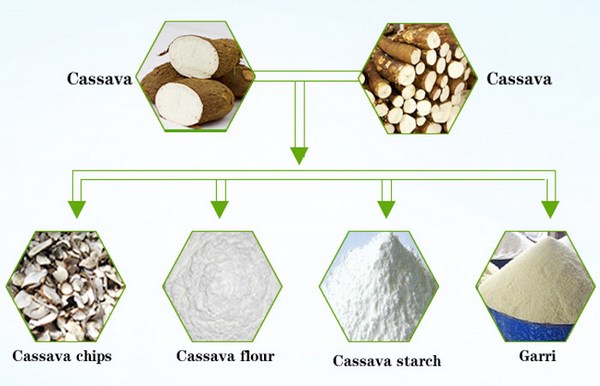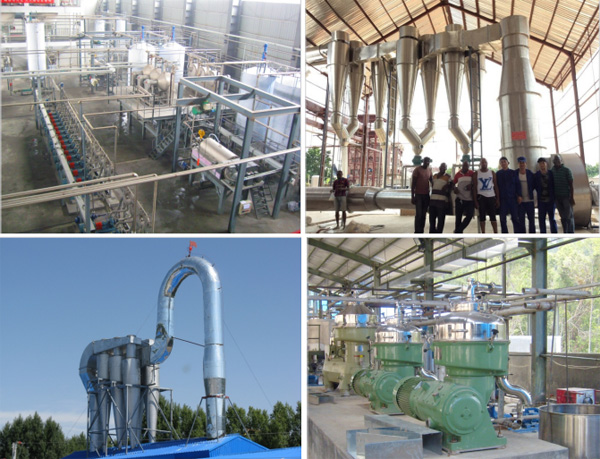Cassava planting and processing in Nigeria
Industry News / Chat online / Technical support / August 13, 2018
Nigeria is the largest cassava growing country all over the world, with cassava harvesting area accounting for nearly 20% of the world total. According to the Nigerian "Business Daily" reported on April 2, although Nigeria is the world's largest producer of cassava, in 2017, Nigeria still imports a large number of cassava by-products such as starch, powder products and ethanol. The import value is close to 654 million US dollars. Foreign exchange reserves have created some pressure. According to industry insiders, if Nigerian domestic manufacturers can use local rich cassava raw materials to produce and process such products, they can save foreign exchange and bring opportunities to the industry. However, Nigerian manufacturers and importers said that due to the large gap between the quality and processing technology of cassava processed products in Nigeria compared with imported products, there are many system supporting problems in the development of the industry, and it is still difficult to achieve import substitution.

Cassava processing
Nigeria's cassava industry value chain needs more basic conditions:
First, the cassava variety needs to be improved, and the current commercial development value of the variety is low. The content of tapioca starch grown in Nigeria is generally low. If it can be improved by varieties, it can reach the level of 38-40% of tapioca starch in Thailand, India and Malaysia, and its commercial development value can be seen.
Second, the cost of agricultural materials is high, affecting the level of yield. In the growing season of cassava, the control of weeds is not in place, and it is basically in a state of natural growth. The cost of agricultural materials such as pesticides is too high, which affects the enthusiasm of farmers for large-scale production. At present, Nigeria's cassava output per hectare is 10.6-15 tons, which further increases productivity and requires the government to provide certain subsidies.

Our cassava processing plant project in Nigeria
Third, the production of cassava lacks the correct value orientation. The positioning of Nigerian cassava processing enterprises is still oriented to local basic consumption and as a staple food substitute. There is no commercial development and export-oriented production target, and no refined processing technology and financial support. Cassava can be processed into industrial starch, alcohol, syrup, sweeteners, animal feed, and tapioca beer. The above-mentioned by-product development has success stories in many countries in Africa. At present, the international market price of industrial starch is 200,000 naira per ton, and Nigeria has an annual output of 46 million tons of cassava. If it can enter the finishing stage, the industrial value chain can be reflected. According to incomplete statistics, Nigeria imports cassava by-products of 580 million US dollars each year to develop cassava resources, and only local demand is promising.
Fourth, the lack of basic storage and processing facilities, the post-natal loss rate is too high. Although the workload of cassava production in Nigeria is much smaller than that of other food crops, due to the lack of warehousing and processing facilities, the post-harvest loss rate is extremely high, and the transportation costs caused by various factors are high. It takes time to construct the cassava industry value chain.
According to Nigeria's "Business Daily" report, the Nigerian government plans to transform from a single oil economy to a diversified economy, and the development of cassava is one of the government's strategic plans. However, there are still many shortcomings in the development of the value chain of the cassava industry in Nigeria. Need to be further improved.
contact us
- Do you want to buy machine?
- Yes, I want to buy machine
- No, I want to learn more in advance.
- What is your raw material?
- Cassava
- Potato
- Sweet potato
- Others
- 2. What is the final product you want to produce?
- Garri
- Cassava flour
- Cassava starch
- Cassava chips
- Attiekie
- Bammy
- Others
- 3.What is your capacity plan?
- Small scale garri machine
- 1ton per day
- 2tons per day
- 3tons per day
- 10tons per day
- 20tons per day
- Others
- 3.What is your capacity plan?
- Small scale
- 5tons per day
- 10tons per day
- 20tons per day
- 50tons per day
- 100tons per day
- Others
- 3.What is your capacity plan?
- Small scale
- 5tons per day
- 10tons per day
- 20tons per day
- 50tons per day
- 100tons per day
- 200tons per day
- 300tons per day
- Others
- 3.What is your capacity plan?
- Small scale
- Middle type
- Large scale
- What is your capacity plan?
- Small scale
- 5tons per day
- 10tons per day
- 20tons per day
- 50tons per day
- 100tons per day
- 200tons per day
- 300tons per day
- Others

 Call us
Call us Chat online
Chat online
